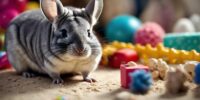How to Create a Diet Plan for a Healthy Chinchilla
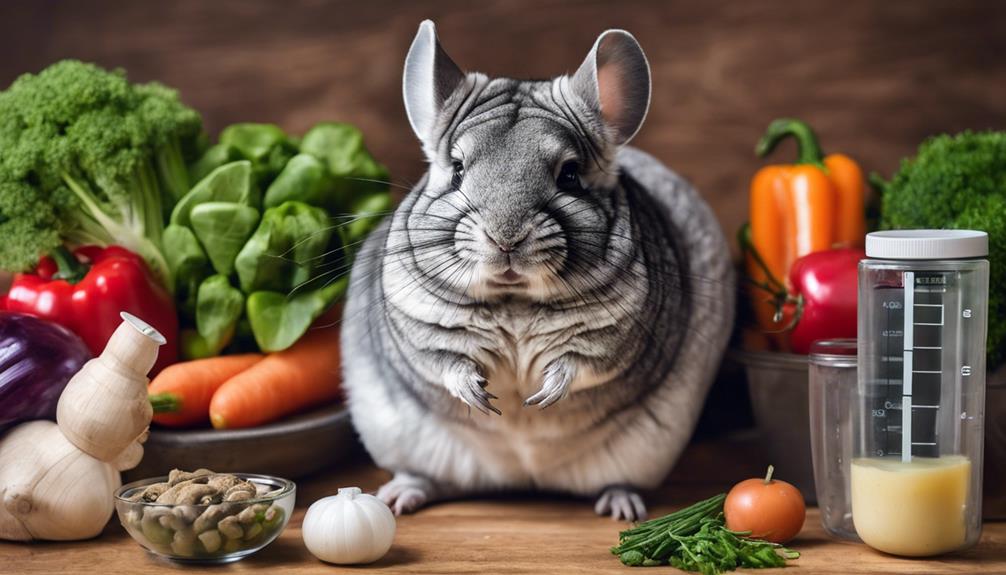
Chinchillas are adorable pets that require a specific diet to stay healthy. A balanced diet for a chinchilla should consist mainly of high-quality hay, such as timothy hay, which provides essential fiber for their digestive system. Pellets formulated for chinchillas can also be given in small amounts to ensure they receive necessary vitamins and minerals. Fresh water should always be available in a sipper bottle to keep your chinchilla hydrated.
Fruits and vegetables should be given as occasional treats, as they can upset the delicate balance of a chinchilla's digestive system. Avoid giving your chinchilla foods high in sugar or fat, as these can cause health issues like obesity and dental problems. It's essential to monitor your chinchilla's weight and adjust their diet accordingly to ensure they stay at a healthy weight.
By providing a balanced diet of hay, pellets, and occasional treats, along with fresh water and monitoring their weight, you can help your chinchilla stay healthy and happy for years to come. Remember to consult with a veterinarian experienced in chinchilla care if you have any concerns about your pet's diet or health.
Understanding Chinchilla Nutritional Requirements
Understanding a chinchilla's nutritional requirements is essential for ensuring their health and well-being. When it comes to protein needs, chinchillas require a diet that's high in quality protein to support their growth and overall health. Opt for protein sources like timothy hay, pellets, and small amounts of alfalfa hay. These will help meet your chinchilla's protein requirements, keeping them active and healthy.
In addition to protein, fiber sources are vital for your chinchilla's digestive health. Chinchillas are herbivores, so their diet should primarily consist of fiber-rich foods like hay. Good quality hay provides the necessary fiber that aids in digestion and prevents issues like gastrointestinal stasis. Make sure to offer a variety of hays such as timothy, orchard grass, and meadow hay to keep your chinchilla engaged and maintain a healthy gut.
Selecting High-Quality Hay and Pellets
To guarantee your chinchilla's peak health and well-being, carefully selecting high-quality hay and pellets is key. When it comes to hay, opt for fresh, green, and fragrant varieties, as they provide essential fiber for digestion. Proper hay storage is vital to maintain its freshness and nutrient content; store it in a cool, dry place away from sunlight or moisture to prevent mold growth.
For pellets, choose ones specifically formulated for chinchillas to make sure they receive the necessary vitamins and minerals. When determining the pellet portion, remember that pellets should only make up a small portion of your chinchilla's diet compared to hay. Overfeeding pellets can lead to obesity and other health issues, so moderation is key.
Incorporating Fresh Vegetables and Fruits
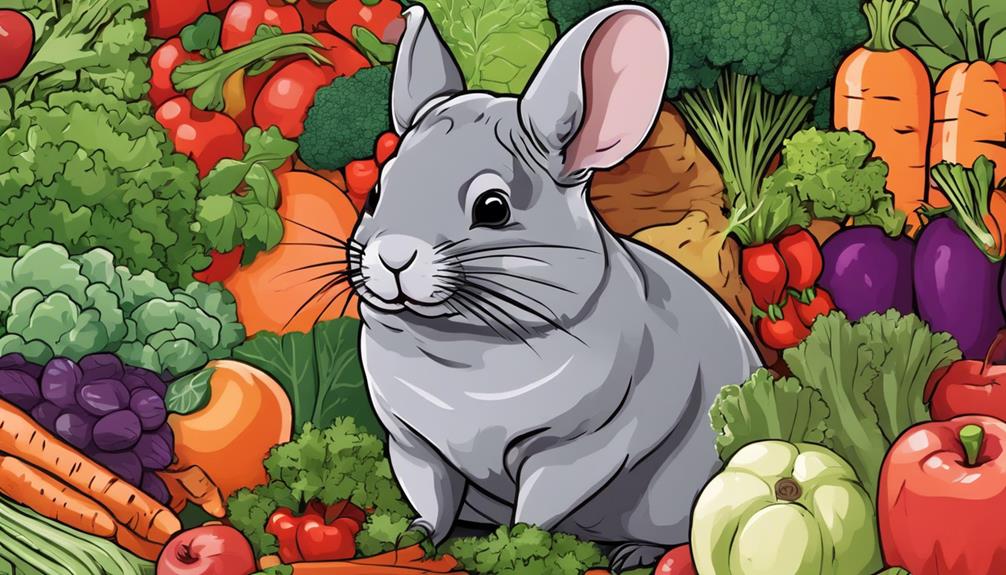
When considering the diet of your chinchilla, fresh vegetables and fruits play an important role in providing essential nutrients and variety to their meals. Including nutrient-rich options such as leafy greens like kale, spinach, or romaine lettuce can offer crucial vitamins and minerals to keep your chinchilla healthy. Additionally, fruits like apples, pears, or berries can serve as tasty treats that add diversity to their diet.
To guarantee a balanced diet, aim to provide a mix of vegetables and fruits to meet your chinchilla's nutritional needs. Rotate the types of produce you offer to introduce variety and prevent boredom. Remember, moderation is key when incorporating fruits due to their sugar content. Small, bite-sized pieces of fruits and vegetables can be given daily but make sure not to overfeed.
Providing Clean Water and Hay
As you continue to nurture your chinchilla's well-being, ensuring access to clean water and a constant supply of fresh hay is vital for their health and importance. Here are some key points to keep in mind:
- Water Quality: Make sure the water you provide is fresh and clean. Chinchillas are sensitive to impurities, so regular water changes are vital to prevent any contamination.
- Hay Storage: Store hay in a dry, well-ventilated area to maintain its freshness and prevent mold growth. Moldy hay can be harmful to your chinchilla's digestive system.
- Quantity Monitoring: Keep an eye on how much hay your chinchilla consumes daily. Adjust the amount based on their appetite to ensure they've enough fiber for proper digestion.
- Variety: Offer a mix of different hays for consideration nutritional variety and prevent boredom. Timothy hay is a staple, but adding in other grass hays like orchard grass can be beneficial for overall health.
Monitoring Chinchilla's Weight and Health
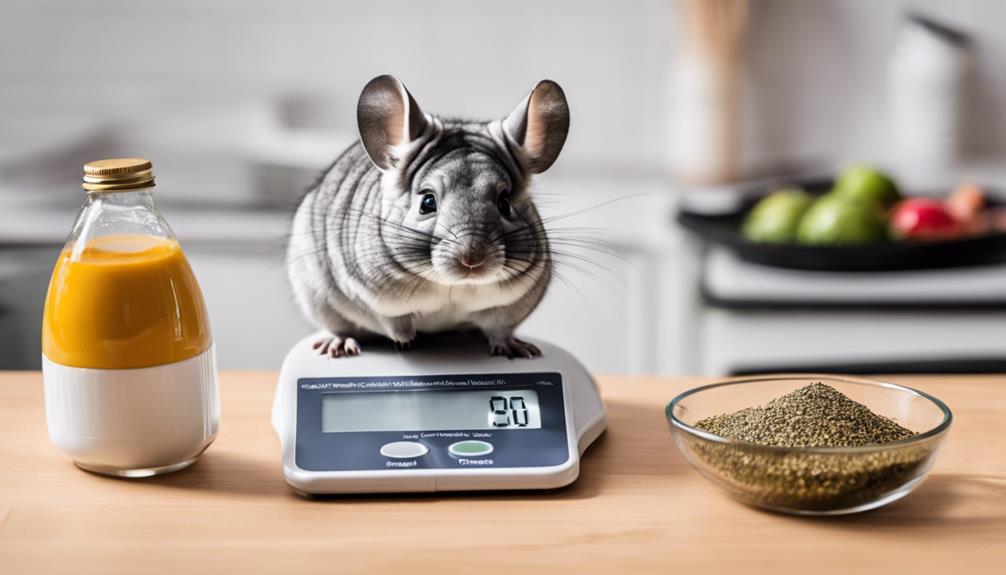
Keeping a close eye on your chinchilla's weight and overall health is paramount in ensuring their well-being and longevity. Weight management plays an important role in maintaining your chinchilla's health. Regularly weigh your chinchilla using a small scale to track any fluctuations. Sudden weight loss or gain can be indicative of underlying health issues that may require attention.
In addition to weight management, health tracking involves observing your chinchilla's behavior and physical appearance. Look out for signs of lethargy, changes in appetite, or any abnormalities in their fur or eyes. These could be indicators of health problems that need addressing promptly.
To support your chinchilla's well-being, focus on maintaining a nutritional balance in their diet. Make dietary adjustments as needed to ensure they're receiving the right nutrients in appropriate quantities. Consult with a veterinarian experienced in chinchilla care for guidance on crafting a diet plan that promotes the best health and longevity for your furry friend. Regular monitoring and proactive adjustments are key to keeping your chinchilla healthy and happy.
Avoiding Harmful Foods and Treats
When it comes to keeping your chinchilla healthy, it's important to be mindful of the treats you offer and the foods you avoid. Safe treat selection and being aware of toxic foods are key in preventing harm to your furry friend.
Safe Treats Selection
Choosing safe treats for your chinchilla is important to their well-being and health. When selecting nutritious snacks and treat options for your furry friend, consider the following:
- Timothy Hay Treats: Rich in fiber, these treats aid digestion and promote dental health.
- Rose Hips: Packed with vitamin C, these treats boost immunity and overall health.
- Dried Herbs: Varieties like chamomile or peppermint can provide both flavor and health benefits.
- Apple Wood Sticks: Ideal for chewing, these sticks help keep your chinchilla's teeth in good condition.
Toxic Foods Awareness
To safeguard your chinchilla's well-being, it is important to be aware of toxic foods and treats that can harm their health. Chinchillas have sensitive digestive systems that can be easily disrupted by certain foods. It is important to understand the impact of what you feed them. Here is a table to guide you in identifying and avoiding harmful foods:
| Toxic Food | Effects | Safe Alternatives |
|---|---|---|
| Chocolate | Can be toxic and cause death | Plain, untreated pellets |
| Avocado | Leads to fluid accumulation | Hay and fresh water |
| Almonds | Difficult to digest | Rose hips and dried herbs |
Always store chinchilla food in a cool, dry place to maintain freshness and prevent contamination. Be mindful of what you offer to your furry friend to keep them healthy and happy.
Consulting a Veterinarian for Guidance
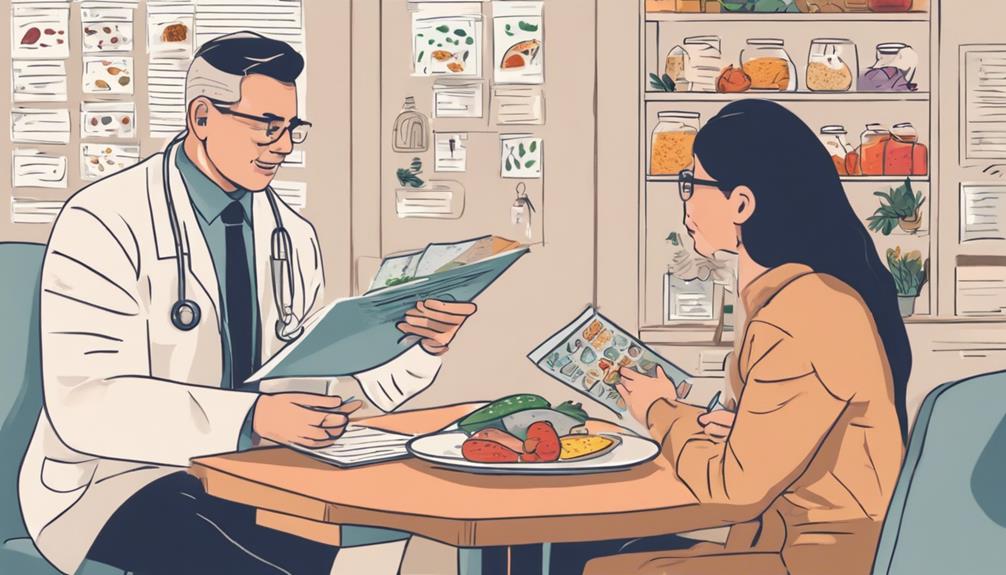
Beginning on the journey to create a healthy diet plan for your chinchilla necessitates seeking guidance from a knowledgeable veterinarian. Consulting a vet guarantees that you receive expert advice tailored to your chinchilla's specific needs. Here are some reasons why this step is vital:
- Customized Feeding Schedule: A vet can help you establish a feeding schedule that aligns with your chinchilla's dietary requirements.
- Dietary Adjustments: Vets can recommend necessary dietary adjustments based on your chinchilla's age, weight, and overall health status.
- Choosing Suitable Dietary Supplements: With their expertise, vets can guide you in selecting the right dietary supplements to support your chinchilla's health.
- Monitoring Chinchilla Health: Regular consultations with a vet allow for monitoring your chinchilla's health and making any necessary diet changes promptly.
Frequently Asked Questions
Can Chinchillas Eat Nuts and Seeds as Part of Their Diet?
When considering their nutritional needs, remember that chinchillas can enjoy nuts and seeds in moderation as safe treats. These additions can provide variety and enrichment to their diet, but be cautious with portion sizes.
How Often Should I Change My Chinchilla's Water and Hay?
Sip and nibble, like clockwork, your chinchilla's water and hay need replenishing. Clean water flows daily; premium hay fuels them, keeping digestive fires aflame. Respect dietary restrictions, control portions; their health, your loving care intertwine.
Are There Any Specific Vitamins or Supplements I Should Add to My Chinchilla's Diet?
When caring for your chinchilla, remember dietary restrictions are essential. Stick to quality hay, pellets, and fresh water. Offer treats like raisins sparingly. Vitamin C supplements are recommended. Keep your chinchilla healthy with a balanced diet.
How Can I Tell if My Chinchilla Is Overweight or Underweight?
Feeling unsure about your chinchilla's weight? Watch for signs like a lack of energy or a prominent ribcage. For weight management, consider portion control and exercise routines. Your chinchilla's well-being starts with you!
Are There Any Specific Feeding Schedules or Meal Plans I Should Follow for My Chinchilla?
To guarantee your chinchilla's health, establish consistent feeding habits and an exercise routine. Maintain nutritional balance by providing hay, pellets, and limited treats. Monitor weight to manage appropriately. Consult a vet for personalized advice.


